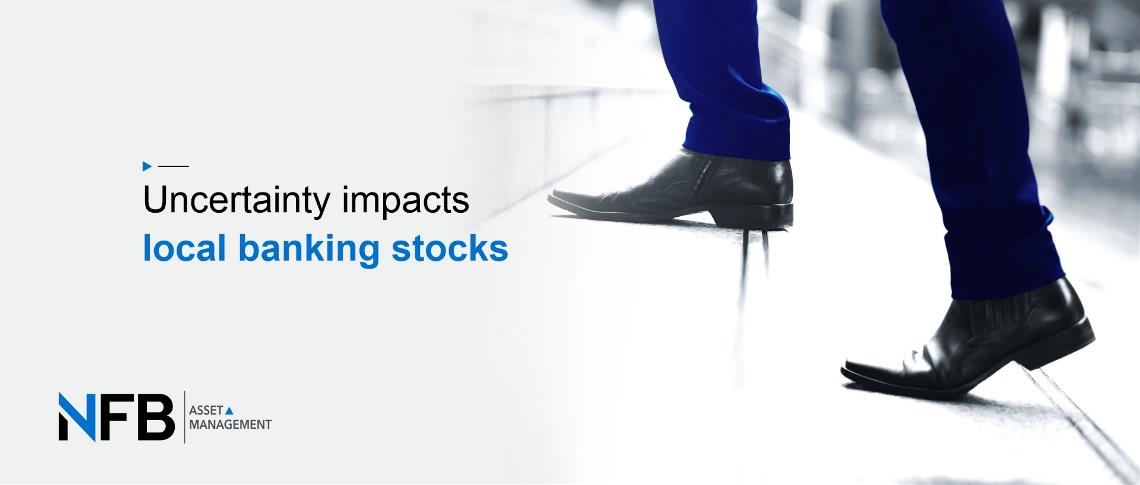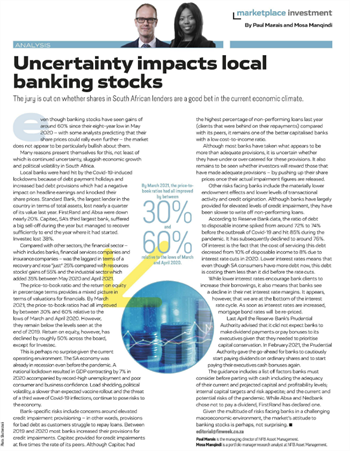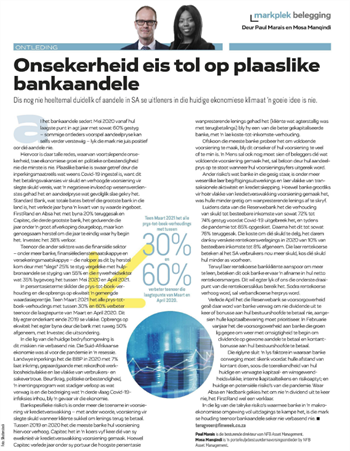Uncertainty impacts local banking stocks
The jury is out on whether shares in South African lenders are a good bet in the current economic climate


Despite the fact that banking stocks have seen gains of around 60% since their eight-year low in May 2020 – with some analysts predicting that their share prices could rally even further – the market does not appear to be particularly bullish about them.
There are a host of reasons for this, not least of which is continued uncertainty, sluggish economic growth and political volatility.
Local banks were hard hit by the Covid-19 induced lockdowns both as a result of debt payment holidays and increased bad debt provisions which had a negative impact on headline earnings and knocked their share prices. Standard Bank, the largest bank in the country in terms of total assets, lost nearly a quarter of its value last year. FirstRand and Absa were down nearly 20%. Capitec, the country’s third largest bank, suffered a big sell-off during the year but managed to recover sufficiently to end the year where it had started. Investec lost 38%.
Compared to other sectors, the financial sector – which includes banks, financial services companies and insurance companies – was the laggard in terms of recovery up just 25% compared to resources which were up 55% and the industrial sector which was up 35% in April 2021 compared to May 2020.
The price-to-book ratio and the return on equity in percentage terms provides a mixed picture in terms of valuations. By March 2021 price-to-book ratios had all improved by between 30 to 60% relative to the Covid-induced lows of March and April 2020. However, they remain below the end of 2019 levels. Return on equity, however, has declined by roughly 50% across the board, with the exception of Investec.
This is perhaps no surprise given the current operating environment. The South African economy was already in recession even prior to the pandemic. A national lockdown resulted in a 7% GDP contraction in 2020 and was accompanied by record high levels of unemployment and poor consumer and business confidence. Load shedding, political volatility, a slower than expected vaccine rollout and the threat of a third wave of Covid-19 infections, continue to pose a risk to the economy.
Bank specific risks include concerns around elevated credit impairment provisioning - in other words, provisions for bad debt as customers struggle to repay loans. Between 2019 and 2020 most banks increased their provisions for credit impairments. Capitec provided for credit impairments at five times the rate of its peers. Although Capitec had the highest percentage of non-performing loans last year – in other words, clients that were behind on their repayments – compared to its peers, it remains one of the better capitalised banks with a low cost-to-income ratio.
Although most banks have taken what appears to be more than adequate provisions, only time will tell whether they have under or over catered for these provisions – and it remains to be seen whether investors will reward those that have made adequate provisions by pushing up their share prices once their actual impairment figures are released.
Other risks facing banks include materially lower endowment effects and lower levels of transactional activity and credit origination. Although banks have largely provided for elevated levels of credit impairment, they have been slower to write-off non-performing loans.
According to South African Reserve Bank (SARB) data, the ratio of debt to disposable income spiked from around 72% to 74% pre-Covid to 85% during the pandemic. It has subsequently fallen back to around 76%. Of interest is the fact that the cost of servicing this debt has fallen from 10% of disposable income to 8% as a result of a number of interest rate cuts in 2020. Lower interest rates means that even though South African consumers have more debt currently, this debt is costing them less than it did prior to the rate cuts.
While lower interest rates encourages bank clients to increase their borrowings, it also mean that banks see a decline in their net interest rate margins. It appears, however, that we are at the bottom of the interest rate cycle. As soon as interest rates are increased bond rates will be re-priced.
Last April the SARB’s Prudential Authority advised that it did not expect banks to make dividend payments or pay bonuses to its executives given that they needed to prioritise capital conservation. In February 2021 the Prudential Authority gave the go-ahead for banks to cautiously start paying dividends on ordinary shares and to start paying their executives cash bonuses again. The guidance includes a list of factors banks must take into consideration before parting with cash including the adequacy of their current and projected capital and profitability levels; internal capital targets and risk appetite; and current and potential risks of the pandemic. While Absa and Nedbank have elected not to release a dividend, FirstRand has declared a dividend.
Given the multitude of risks facing banks in a challenging macroeconomic environment the market’s attitude to banking stocks is perhaps, not surprising.
| This article was written exclusively for Finweek Magazine. It was published in the 28 May 2021 edition on page 15. You can access the original print coverage here. Make sure to subscribe to Finweek to ensure you don't miss out on insight articles like these. |
|
 |
 |













